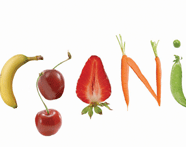Feeding your Baby Organic

Organic food is becoming more popular than ever. Sales are increasing at 20 per cent per year, and over 1.3 million acres of land in Canada are used to grow organic crops. Prices are continuing to drop, and more options are widely available. Will you choose organic for your baby?
Read Your Labels
Food labels such as “natural,” “traditional,” “free range” or “environmentally friendly” do not mean organic. Organic foods will have a label on the packaging that reads “Certified Organic.” All foods that carry this label must be inspected and follow strict standards.
Organic food is produced by registered growers and is manufactured with no synthetic pesticides, herbicides, chemical fertilizers or bio-engineering. Organic meat, poultry, eggs and dairy products come from animals that are not given anti-biotics or growth hormones.
Organic farming is environmentally friendly, keeping the planet healthy for your baby!
There are fewer chemical residues in organic foods, and in children who regularly eat organic foods. Benefits of Choosing Organic Babies are thought to be more vulnerable to toxins in food because of their rapidly developing organs, which is why an organic diet could be good for them (moms will enjoy it too!). Eating organic reduces baby’s exposure to pesticide chemicals and tastes better. Buying organic benefits the environment. By choosing organic food, you are helping sustainable farming practices grow. Organic farming protects future waters through the use of natural ingredients in the soil; and it decreases soil erosion. Organic farming also promotes the use of renewable resources and soil and water conservation. Buying organic is an investment in the future of the earth.
Eating Organic from Preconception to Breastfeeding and Beyond
You may want to consider switching to organic food when you begin planning to conceive. During pregnancy, the chemicals in pesticides can reach your baby through the umbilical cord, and later through your breast milk. Choosing to eat organic during preconception and beyond will lower the chances of passing these chemicals to your little one. Unborn babies and infants are the most susceptible to pesticide chemicals.
Organic Baby Food
Once your baby is being introduced to solids, you will probably want to keep feeding her organic. Making your own homemade baby food can be a huge task for a new mom. To save time, and still give your baby the healthy food she needs to grow, here are a few organic baby food choices:
My Organic Baby – A complete line of certified organic baby foods in Canada that includes: formula, vegetables and fruit, cereal, juice, teething biscuits and baby snacks called Fruit Friends.
YoBaby Organic Yogurt – Made from organic, whole milk and fruit, YoBaby yogurt is available in three different flavour combo packs. YoBaby comes in a drinkable form (great for sippy cups); as well as a yogurt and cereal mix (YoBaby Plus Fruit and Cereal).
Sweetpea Baby Food Frozen – organic baby food in individual cubed portions. Sweetpea foods are wheat free and soy free, with no artificial flavours, colours or preservatives.
Always wash fruits and vegetables before eating, and eat certified organic foods to minimize your risk of pesticide exposure. If you feel that organic is too expensive, you can just substitute the foods that are highest in pesticides.
Food with High Pesticide Levels – Strawberries, Raspberries, Cherries, Apples, Bell peppers, Apricots, Peaches, Pears, Cantaloupe, Green Beans, Cucumbers, Potatoes, Nectarines, Spinach, Celery, Imported grapes
Low Pesticide Levels – Broccoli, Cauliflower, Sweet corn, Peas, Plums, Bananas, Avocadoes, Asparagus, Onions, Green onions, Watermelon, Sweet potatoes, Mango, Pineapple



